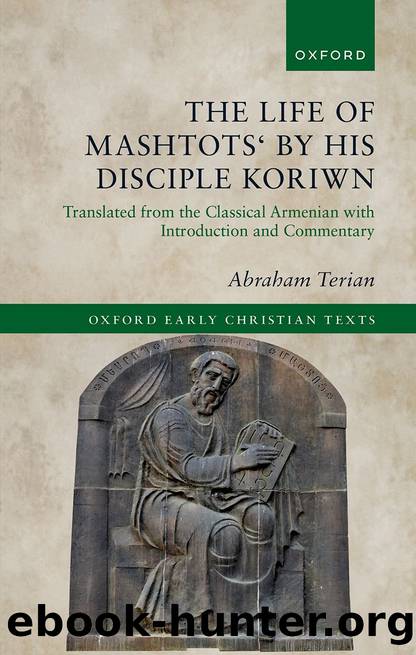The Life of Mashtots' by His Disciple Koriwn: Translated from the Classical Armenian with Introduction and Commentary by Abraham Terian;

Author:Abraham Terian; [Terian, Abraham]
Language: eng
Format: epub
ISBN: 9780192696359
Publisher: Oxford University Press USA
Published: 2022-09-29T00:00:00+00:00
Chapter 2
1. the lives of men made perfect. Arm. zvars arantsân katarelotsâ; as in Gk. teleiÅmenoi, the latter term is used for the departed faithful, the dead in Christ, especially the martyred saints (cf. katarelotsâ in 28/27.1 [96.5â6], and katarumn in 27/26.1 and 29/28.1 [92.5; 96.18], with reference to the departed fathers in the authorâs bracketing the book literarily). The phrase owes to Heb. 12:23, âthe spirits of the righteous made perfectâ (Arm. yogis ardarotsâ katarelotsâ) in the heavenly Jerusalem (v. 22); cf. Heb. 10:14, on Christ making perfect those who are sanctified.
It is beyond the scope of this brief commentary to go over the concept of âperfect menâ in Greek paideia. In biblical terms, the concept appears rarely in the Septuagint (LXX) and the Armenian version of the Bible (Deut. 18:13, on being perfect before God, and 2 Kgs. [2 Sam.] 22:26, on associating with people deemed perfect; Sir. 44:17 LXX, said of Noah). In the Post-Apostolic Fathers, it is said of Esther, being âperfectâ in faith (1 Clem. 55.6); Ignatius describes the âperfectâ Christians (Ign. Eph. 15.2); and the Didache declares âperfectâ those capable of bearing the whole yoke of Christ (Did. 6.2). The Desert Fathers were generally considered âperfect menâ for having heeded the call in Matt. 19:21.
On justification to write such an account, to which this entire chapter is dedicated, see Introduction (B).
3. the narrative by Moses. The Pentateuch, Genesis to Deuteronomy.
4. acceptable sacrifice. Alluding to the sacrifice of Abel (Gen. 4:3â12), called ârighteousâ in Heb. 11:4.
appeared to go on living. Alluding to Enoch (Gen. 5:21â4); cf. Heb. 11:5.
protected in a ship. Alluding to Noah (Gen. 6:9â8:22); cf. Heb. 11:7.
justified through newfound faith. Alluding to Abraham (Gen. 12:1â22:19; cf. Rom. 4:1â22; Heb. 11:8â10).
5. all the books that make God known. The canonical writings regarded as Scripture: the Old Testament canon being the same as that of the Septuagint, including various apocryphal and at times deuterocanonical books such as the Testaments of the Twelve Patriarchs; and the New Testament canon, including Third Corinthians, unique to the Armenian canon (elsewhere part of the apocryphal Acts of Paul), and excluding the Book of Revelation.
6. names (in the letter) to the Hebrews. Heb. 11:4â32.
Rahabâs hospitality to the spies. Heb. 11:31; cf. Jas. 2:25, recalling Josh. 2:1â21; 6:17, 22â5.
9. Nimrod. The first of the post-Flood heroes in the Genesis table of nations and mythic founder of Babylon (Gen. 10:8â9). The Heb. Bible (MT) has: ââ¦a mighty hunter before the Lord.â The Gk. Bible (LXX) contrarily has: ââ¦a mighty hunter against the Lordâ; not so the Arm. Bible, which follows the Heb. reading. The negativity stems from Nimrodâs mythic ties to Babylon, the power that opposes Godâs people in biblical history.
Samson. Judg. 15:24â16:31.
David. 1 Sam. 16:12â30:31 and 2 Sam. especially.
10. Joseph in Egypt. Gen. 39:1â50:26.
Daniel in Babylon. As recounted in the Book of Daniel.
11. counsellors to mighty kings. Such as Joseph and Daniel, already named, in the service of foreign kings; so too Nehemiah and possibly Ezra. Mordecai in the Book of Esther may also be considered as one in the service of a foreign king.
Download
This site does not store any files on its server. We only index and link to content provided by other sites. Please contact the content providers to delete copyright contents if any and email us, we'll remove relevant links or contents immediately.
Getting It, Then Getting Along by L. Reynolds Andiric(603)
Global Justice, Christology and Christian Ethics by Lisa Sowle Cahill(380)
Religion and Politics Beyond the Culture Wars : New Directions in a Divided America by Darren Dochuk(352)
Positive Psychology in Christian Perspective: Foundations, Concepts, and Applications by Charles Hackney(318)
Forgiveness and Christian Ethics by Unknown(305)
Douglas Hamp The First Six Days by Unknown(202)
Christian Martyrdom and Christian Violence by Matthew D. Lundberg;(193)
The Oxford Handbook of Greek and Roman Mythography by R. Scott Smith;Stephen M. Trzaskoma;(186)
Beyond Heaven and Earth by Gabriel Levy(181)
God and Eros by Patterson Colin;Sweeney Conor;(178)
The Bloomsbury Reader in Christian-Muslim Relations, 600-1500 by David Thomas;(177)
Autobiography, Volume 2: 1937-1960, Exile's Odyssey by Mircea Eliade(167)
Witches: the history of a persecution by Nigel Cawthorne(165)
Cult Trip by Anke Richter(165)
Insurgency, Counter-insurgency and Policing in Centre-West Mexico, 1926-1929 by Mark Lawrence(160)
The Horrors and Absurdities of Religion by Arthur Schopenhauer(153)
The Myth of Disenchantment by Jason A. Josephson-Storm(152)
The Believer by Sarah Krasnostein(150)
An Introduction to Kierkegaard by Peter Vardy(150)
